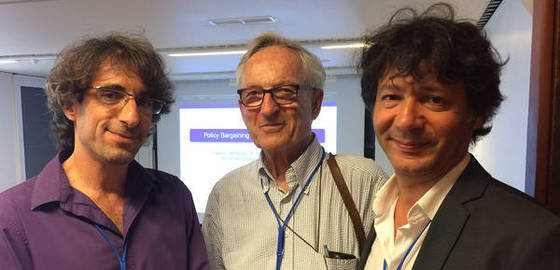D-TEA conference: Can Majority Judgment Solve the Iniquities of the Majority Rule Voting System ? Two Researchers Are Convinced it Can
HEC Professor Itzhak Gilboa and his team decided to devote themselves to the theme of voting at the 2017 D-TEA workshop (Decision: Theory, Experiments & Applications). Set in the historic Institut Henri Poincaré, central Paris, the economist and specialist in Decision Sciences invited Michel Balinski and Rida Laraki to share their proposals to replace the Majority Rule electoral system with their own pioneering Majority Judgment paradigm. The two Paris-based researchers have been working on this concept since 2002.

“We are convinced Majority Rule is not the right method to choose between two candidates,” explains CNRS Director of Research Rida Laraki with disarming conviction. The specialist on game theory and social choice joined forces with fellow CNRS Director at Polytechnique Michel Balinski to bring out a seminal 2011 publication Majority Judgment: Measuring, Ranking and Electing . This 432-page work has been widely praised. “Path-breaking” enthused H. Peyton Young of Oxford University; “a work of astonishing originality,” added Pennsylvania University’s Jack Nagel. “A revolutionary book”, insisted Ralph E. Gomory, US National Medal of Science laureate, who went on to applaud the researchers’ use of grades, not rankings, to give birth to “simple and practical methods” for voting. Politics Professor at Oxford University, Iain McLean, elaborated: “This could be the most important work on the problem of collective choice since 1951, or even since 1785. It shows that wine judges have come closest to finding practical solutions to the problem.”
Finally, Nobel laureate in Economics Kenneth Arrow opined that the book “may well lead to a useful transformation in election practice.” Incidentally, the ninth edition of the D-TE&A was dedicated to this Stanford University professor who passed away in February 2017. His Impossibility Theorem had revolutionized social choice theory in the Sixties.
Following the opening D-TEA session, Yale economist Larry Samuelson agreed that Michel Balinski and Rida Laraki have presented a thoroughly researched and convincing argument against Majority Rule and for Majority Judgment. “They’ve presented a very important mix of practical knowledge and theoretical foundations. Now they need to persuade people to use them.”
During his long and glittering academic career, Michel Balinski has been working for over 40 years on alternative voting systems, as illustrated by his 1982 joint book with Peyton Young Fair Representation: Meeting the Ideal of One Man, One Vote . But the retired Yale academic insists the debate on our voting system is centuries old. “Some of the main difficulties were pointed out by Condorcet over 200 years ago,” he told us shortly after his D-TEA presentation, “because, with our current voting system, all we learn is which one we prefer out of as many as ten candidates.” The 83-old emeritus researcher pointed out two of the most egregious examples of the failure of the majority rule system: “In the 2002 French presidential race the run-off between Chirac and Le Pen was idiotic: in run-offs Jospin, eliminated in the first round, would have beaten Chirac, and Le Pen couldn’t have defeated anyone. And the same goes for the 2000 US election: Al Gore would have won Florida and so defeated George W. Bush had not a candidate who had no chance of winning (Ralph Nader) been on the ballot.”
Rida Laraki offered two more recent examples: “In this year’s French presidential run-off, many citizens refused to participate simply because they didn’t wish to give their votes to either candidate, though they hated Marine Le Pen and were lukewarm for Emmanuel Macron. Then you have Donald Trump’s election when Hillary Clinton clearly dominated the whole campaign.”
Despite what both Laraki and Balinski deem to be travesties in the current popular vote system, they are optimistic that the wind is changing and that nations will adopt new and better systems of voting and representation. “People realize their vote is being stolen, that they are not allowed to express their opinions, that they are not well represented,” says Balinski. “Voters are demanding change,” he continues, “and I’m convinced Majority Judgment will be part of reforms one day.”
Intriguingly, the political changes that both mentioned do seem to be accelerating in France: prime minister Edouard Philippe announced proposals in June for an institutional reform that would mix the election of deputies by proportional representation (of parties) with the current method of electing them in single-member districts.
****
More about:
The program of the D-TEA conference
L’élection présidentielle au Jugement Majoritaire — Les résultats sur laprimaire.org
Itzhak Gilboa's website
Knowledge@HEC Special Issue : The hunt for better decisions